We are interviewing Jornt Spit, research lead on fertilizers and substrates in the R&D division of DCM, and Bas Nieuwesteeg, account manager for the biorationals team of DCM. Prior to jumping into CfC-related questions, let us understand what type of company DCM is? ”DCM is a family-owned company from Belgium, established in 1966, producing (bio)fertilizers, and, what we call biorational products, including biostimulants, such as Instant TD, a microgranule coated with Trichoderma, and biocontrol products, like our PMV®-01 vaccine. A vaccine against the Pepino Mosaic Virus in tomato.” Bas says. “DCM has developed a unique MINIGRAN® technology”, Jornt adds, “producing dust and smell-free ultra-fine organic granules that contain more than forty different raw materials, sourced from different waste streams of the food industry. Each granule has a homogeneous composition, allowing for a precise and uniform spread in a substrate or soil. Generally, our philosophy is that we first feed the soil, which in its turn feeds the plant. The organic fertilizers are degraded by soil life into nutrients that become available when the plant needs them.”
According to Bas and Jornt, this is the first time DCM is involved in cannabis cultivation research. The CfC project was an opportunity for DCM to evaluate its products in this crop. “Unlike with other crops, to do research on medicinal cannabis, you need to have a special permit, which is why we have not been able to perform tests ourselves so far. Therefore, we have joined this consortium, to be able to do combined research, with all the other partners.” Jornt explains. “Researching the possibilities of growing organic to a level that is expected from the medicinal market has been the starting trigger for us. However, as the research progresses, introducing benefits of organic practices and DCM products in conventional growing can also become a focus point.“
As CfC is now ending its fourth cultivation cycle, almost a year in, we wondered about how much progress DCM managed to make during this time. “In the first year of the CfC project, our focus has been on organic cultivation.” Bas Nieuwesteeg says. “Our main first goal as DCM we have already achieved, completing a full cycle with high organic crop yields, comparable to conventional growing, both in quantity and quality.” “So far we also have been comparing fast- and more slow-release organic fertilizers,” Jornt adds. “We have been optimizing these fertilizer potting mixtures in the function of the crops’ needs, taking into account the specific climate conditions that are currently used in the CfC-greenhouse. The high temperatures and light intensities that are used for growing medicinal cannabis, are not something we experience a lot in other horticulture crops. Therefore we need to adjust the organic fertilizers to have a balanced nutrient release pattern, fit for this climate.“
“On top of finding the optimal organic fertilization recipe, we will keep researching the implementation of different beneficial applications of our biostimulant products and thereby further improving crop vigor.” Bas joined the discussion.“For example, and that’s maybe one of our main findings until now within this CfC project; in two consecutive cycles, we noticed that the plants that have been grown in an organic substrate showed more resilience. If we can confirm these results, this is a significant outcome, which fits in DCM’s philosophy of resilient growing using organic inputs.” Jornt concludes.

CfC also has a stone wool substrate in its cultivation setup, therefore we asked DCM if they consider looking into this substrate as well, to research the impact of their fertilizers combined with an inert substrate. “First of all, we firmly believe that growing organic has an added value, a healthy soil life benefits a healthy crop.” Jornt says. Bas joins in and adds, “But as mentioned before, we have only been doing this for the first year. At the moment the focus has been on organic fertilizers in organic substrates. Nevertheless, we have products that can be applied to stone wool (e.g., microbiological products), and in the future testing these products for cannabis cultivation on stone wool is certainly a possibility. As for now, we are not there yet.”
Next, we asked about DCM cannabis market penetration; which region do they aim to serve, etc. “At DCM we are convinced that there is a big market for the resilient growing of medicinal cannabis and that we can play a vital role in the development of that growing strategy. Of course, our initial focus is to learn more about the crop and the different possibilities. DCM hopes that by the time Cultivation for Compounds is finalized, things will have been moving on the legislation front; “We want to be ready for the time when more and more countries get on board with medicinal cannabis.”
At the end of the interview we asked about their general feeling about the CfC, to which Bas and Jornt responded with the following “Overall, DCM is very happy with CfC; First of all, because of the amount of knowledge and experience we are gaining from it. We learn a lot. Of course it can be challenging sometimes. Combining and aligning all partners’ different opinions and desires can be difficult. On top of that, as is to be expected from a research project of this size, there have been some difficulties and technical issues in the beginning. But yet, with everything that is happening, we manage to cooperate, reach agreements and compromises with the consortium, and things keep going better. We learn, which is an important goal I think all partners share.”

* Cultivation for Compounds is partly funded by PPS surcharge for research and innovation from the Ministry of Economic affairs and climate.





